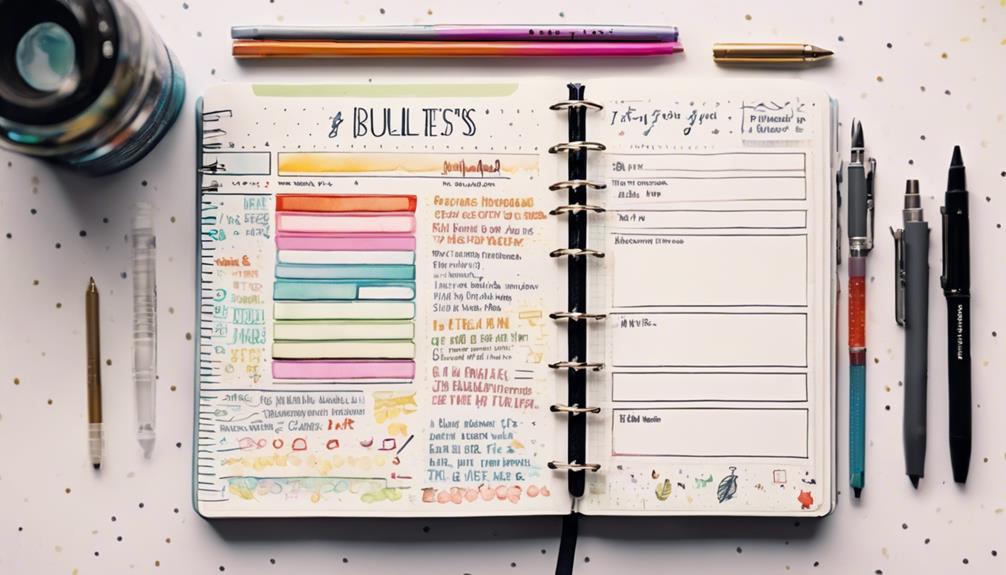You may not realize that the type of journal you use can significantly impact your mental health journey. Choosing the right journal can enhance your well-being in ways you might not expect.
From promoting positivity to boosting self-awareness, different journals cater to various aspects of mental health.
So, if you're looking to explore how journaling can help you thrive, understanding the best journals suited for mental health might just be what you need to kickstart your path to emotional wellness.
Key Takeaways
- Structured journaling promotes self-awareness and stress management.
- Various journal types cater to different mental health needs.
- Journaling techniques enhance positivity, emotional monitoring, and self-awareness.
- Quality features and daily incorporation maximize mental health benefits.
Benefits of Journaling for Mental Health

Journaling regularly can significantly improve mental health by providing a structured outlet for processing emotions and thoughts. Engaging in mindful writing practices can offer stress relief by allowing you to unload your mind onto paper, creating a sense of clarity and organization. When you pour out your thoughts onto the pages of a journal, you give yourself the opportunity to reflect on your experiences, gain insights into your emotions, and identify patterns in your thinking.
🌊 Discover Endless Fun with Beachcomber Press Puzzle Books! 🌊
Elevate your puzzle game with our captivating collection on Amazon.
Perfect for all ages, our books are packed with unique
challenges that promise hours of entertainment.
Mindful writing entails being present in the moment as you jot down your feelings and observations. This practice encourages you to slow down, focus on your thoughts, and process them intentionally. By engaging in mindful journaling, you can cultivate a deeper understanding of yourself and your reactions to various situations. This heightened self-awareness can help you manage stress more effectively and develop healthier coping mechanisms.
In essence, incorporating mindful writing into your routine can serve as a powerful tool for stress relief and mental well-being.
Gratitude Journal: Fostering Positivity
Fostering positivity through a gratitude journal can have profound effects on your mental well-being and overall outlook on life. Keeping a gratitude journal allows you to focus on the good in your life, shifting your perspective towards positivity. Here are four reasons why integrating a gratitude journal into your daily routine can be transformative:
- Positive Affirmations: Writing down things you're grateful for reinforces positive thinking and self-love.
- Daily Practice: Consistently jotting down moments of gratitude creates a habit of noticing the good in every day.
- Mindfulness Exercises: Reflecting on what you appreciate cultivates mindfulness, bringing you into the present moment.
- Cultivating Gratitude: Acknowledging and documenting the things that bring you joy can increase feelings of happiness and contentment.
Mood Tracker: Monitoring Emotional Well-being
Monitoring your emotional well-being through a mood tracker can provide valuable insights into your mental health journey. By engaging in this self-care check-in, you can track your emotional fluctuations and gain a deeper understanding of your moods.
Using a mood tracker isn't just about recording highs and lows; it's a mindfulness practice that allows you to recognize patterns, triggers, and the impact of various factors on your mental well-being.
Regularly updating your mood tracker can help you identify trends, notice warning signs of declining mental health, and celebrate moments of positivity. It serves as a tool for mental health tracking, enabling you to proactively manage your emotions and seek support when needed.
Whether you're navigating stress, anxiety, or simply striving for better self-awareness, a mood tracker can be a powerful ally in your mental health journey. Embrace this practice with openness and curiosity, using it as a compass to guide you towards emotional balance and well-being.
Reflection Journal: Cultivating Self-Awareness
Cultivating self-awareness through reflective journaling can deepen your understanding of your thoughts and emotions, fostering personal growth and insight. Engaging in this practice allows you to embark on a journey of self-discovery and transformation. Here are four ways a reflection journal can help you on your path to personal growth:
- Clarity: By jotting down your thoughts and feelings, you can gain clarity on your innermost desires and fears, helping you make more informed decisions in your daily life.
- Emotional Regulation: Reflective journaling provides a safe space to explore and process your emotions, leading to better emotional regulation and resilience.
- Pattern Recognition: Keeping a reflection journal enables you to identify recurring patterns in your behavior, thoughts, and emotions, empowering you to make positive changes.
- Self-Compassion: Through self-reflection, you can cultivate self-compassion and understanding, fostering a kinder relationship with yourself and promoting personal growth.
Embrace the power of self-awareness through reflective journaling for a journey towards self-discovery and personal growth.
Creative Journal: Expressing Through Art

Engage in creative journaling through art to explore and express your inner thoughts and emotions in a unique and visually stimulating way. Art therapy, a form of expressive therapy, allows you to delve deep into your subconscious and bring forth feelings that might be difficult to articulate with words alone. By engaging in visual expression through art, you can tap into your creativity and use colors, shapes, and textures to convey your innermost experiences. This process can be incredibly liberating, as it provides a non-verbal outlet for self-expression and introspection.
🌊 Discover Endless Fun with Beachcomber Press Puzzle Books! 🌊
Elevate your puzzle game with our captivating collection on Amazon.
Perfect for all ages, our books are packed with unique
challenges that promise hours of entertainment.
Art therapy in your journal can help you process complex emotions, reduce stress, and gain new insights into your mental well-being. Whether you choose to sketch, paint, collage, or use any other artistic medium, the act of creating can be a powerful tool for self-discovery and healing. Embrace the freedom that art journaling offers, and let your creativity guide you on a journey of self-exploration and growth.
Guided Prompts Journal: Inspiring Insight
Start exploring your inner thoughts and emotions with guided prompts in your journal to gain valuable insights and self-awareness. Engaging in mindful writing through therapeutic exercises can be a powerful tool for self-discovery and personal growth. Here's how a guided prompts journal can inspire insight:
- Promotes Reflection: Guided prompts encourage you to delve deep into your thoughts and feelings, fostering self-reflection and awareness.
- Encourages Emotional Expression: Through specific prompts, you can express emotions that may be difficult to articulate verbally, promoting emotional release and understanding.
- Facilitates Problem Solving: Guided prompts can help you explore solutions to challenges by prompting you to think critically and creatively about your circumstances.
- Enhances Self-Discovery: By engaging in therapeutic exercises within a guided prompts journal, you can uncover new facets of your identity, beliefs, and values, leading to greater self-discovery and personal development.
Bullet Journal: Organizing Thoughts and Tasks

Transition from exploring your inner thoughts and emotions with guided prompts to efficiently organizing your thoughts and tasks by adopting a Bullet Journal system. A Bullet Journal is a versatile tool that can help you enhance your time management skills and foster personal growth. By creating a Bullet Journal, you can streamline your daily activities, prioritize tasks effectively, and track your progress in various aspects of your life.
The beauty of a Bullet Journal lies in its adaptability to your unique needs and preferences. You can customize it to suit your organizational style, whether you prefer a minimalist approach or enjoy adding artistic elements. This flexibility allows you to create a journal that not only keeps you on top of your tasks but also reflects your personality and aspirations.
Through the practice of maintaining a Bullet Journal, you can cultivate a sense of mindfulness and intentionality in your daily routines. By consistently engaging with your journal, you can develop a deeper understanding of your goals, values, and priorities, ultimately fostering personal growth and well-being. Embrace the power of the Bullet Journal to unlock your potential and lead a more organized, fulfilling life.
Frequently Asked Questions
How Can Journaling Help Individuals With Specific Mental Health Conditions Such as Anxiety or Depression?
Journaling provides a safe space for creative expression and self-reflection. It allows emotional release and aids in stress management. By putting thoughts on paper, you gain clarity, process emotions, and develop coping strategies for anxiety and depression.
Are There Any Specific Techniques or Strategies for Incorporating Journaling Into a Daily Routine for Maximum Mental Health Benefits?
To maximize mental health benefits, try incorporating journaling into your daily routine. Practice daily reflection and mindfulness to gain insight. Use creative expression to process emotions and foster gratitude. Consistency is key for your well-being.
🌊 Discover Endless Fun with Beachcomber Press Puzzle Books! 🌊
Elevate your puzzle game with our captivating collection on Amazon.
Perfect for all ages, our books are packed with unique
challenges that promise hours of entertainment.
Can Journaling Be Used as a Form of Therapy or in Conjunction With Therapy Sessions?
Journaling in therapy offers a powerful tool for self-reflection and emotional processing. When combined with mindfulness, it can deepen your therapeutic experience, enhancing insight and promoting healing. Embrace this holistic approach to self-discovery.
Are There Any Potential Drawbacks or Risks Associated With Journaling for Mental Health Purposes?
When journaling for mental health, it's essential to be mindful of potential risks like triggering overwhelming emotions. Remember, moderation is key. If you feel burnout, consider seeking alternatives like therapy to ensure balanced self-care.
How Can Individuals Maintain Consistency and Motivation When It Comes to Journaling for Mental Health?
To maintain consistency and motivation in journaling for mental health, set achievable goals, create a routine, and find an accountability buddy. Celebrate small wins, reflect on progress, and remember that each entry is a step towards self-discovery and healing.
Conclusion
In conclusion, journaling is a powerful tool for improving mental health. By utilizing different types of journals, such as gratitude, mood tracker, reflection, creative, guided prompts, and bullet journals, you can enhance your well-being and thrive.
Whether you're seeking positivity, self-awareness, or organization, there's a journal that can cater to your needs. Take the time to explore these options and discover the benefits of journaling for your mental health journey.

